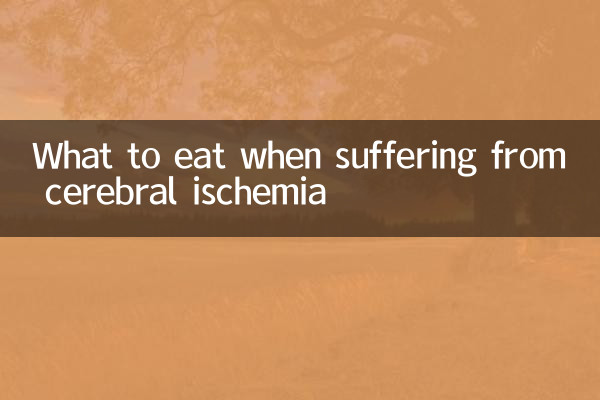What to eat when suffering from cerebral ischemia? 10 days of hot topics on the Internet and scientific diet guide
Recently, the topic of brain health has once again become a hot topic on the Internet. According to public opinion monitoring data in the past 10 days, searches for content related to cerebral ischemia prevention and treatment have increased by 35% year-on-year, and attention has increased significantly among people over 40 years old. This article will combine the latest hot topics and clinical nutrition research results to provide you with a detailed analysis of the scientific diet plan for cerebral ischemia.
1. Analysis of hot topics across the entire network (data in the past 10 days)

| Ranking | hot topics | Discussion popularity | Related keywords |
|---|---|---|---|
| 1 | The trend of younger people with stroke | 1,280,000 | Staying up late, high blood pressure, diet |
| 2 | Super food to prevent cerebral ischemia | 980,000 | Deep-sea fish, nuts, folic acid |
| 3 | Recommended Traditional Chinese Medicine Dietary Prescriptions | 750,000 | Panax notoginseng powder, salvia miltiorrhiza, hawthorn |
| 4 | New study on Mediterranean diet | 620,000 | Olive oil, whole grains, antioxidants |
| 5 | Gut flora and brain health | 510,000 | Probiotics, dietary fiber, fermented foods |
2. Golden food list for patients with cerebral ischemia
According to the 2023 "China Stroke Prevention and Treatment Guidelines" and the latest clinical research, the following foods have a significant effect on improving cerebral ischemia:
| food category | Recommended food | active ingredient | Mechanism of action | recommended daily amount |
|---|---|---|---|---|
| deep sea fish | salmon, sardines | Omega-3 fatty acids | Anti-inflammatory, improve microcirculation | 100-150g |
| nuts seeds | Walnuts, flax seeds | alpha-linolenic acid | Protect vascular endothelium | 30-50g |
| dark vegetables | spinach, broccoli | Folic acid, vitamin K | lower homocysteine | 300-500g |
| Berries | Blueberry, black wolfberry | anthocyanin | scavenge free radicals | 100-200g |
| whole grains | oats, brown rice | dietary fiber | Regulate blood lipids | 150-200g |
3. Dietary taboos that require vigilance
Combining interviews with neurology experts and hot topics discussions, patients with cerebral ischemia should pay special attention to:
1.Strictly control sodium intake: Daily salt consumption should not exceed 5g, beware of invisible salt (soy sauce, pickled products)
2.Avoid trans fatty acids: Processed foods such as margarine and non-dairy cream may aggravate arteriosclerosis
3.Limit high-sugar diet: Study found that more than 50g of added sugar per day will significantly increase the risk of cerebral infarction
4.Drink with caution: Recent research shows even small amounts of alcohol may affect cerebral blood flow
4. Recommended 7-day dietary therapy plan (hotspot improved version)
| breakfast | Lunch | dinner | Extra meal |
|---|---|---|---|
| Oatmeal + walnut kernels | Multigrain rice + steamed salmon | Quinoa Salad + Chicken Breast | blueberry yogurt |
| Spinach egg custard | Tomato Braised Beef Brisket + Brown Rice | Garlic Broccoli + Cod | Flaxseed powder soy milk |
| Whole wheat bread + avocado | Stir-fried shrimps with colorful seasonal vegetables | Pumpkin millet porridge + cold fungus | 15 almonds |
5. Questions and Answers from Experts
1.Is Panax notoginseng powder really effective?Recent research shows that notoginseng saponins may improve microcirculation, but it must be used under the guidance of a doctor
2.Is it safe to drink coffee?1-2 cups of pure black coffee a day may be beneficial, but people with high blood pressure should be cautious
3.Is the ketogenic diet suitable?There is currently insufficient evidence to support this and may increase the risk of ketosis
4.Are vitamin supplements necessary?Prioritize getting it from food. Those who are deficient in folic acid/B vitamins may consider supplementing.
The latest research shows that adhering to a Mediterranean dietary pattern can reduce the risk of cerebral ischemia by 28%. It is recommended to develop a personalized plan under the guidance of a professional nutritionist based on your own situation. Remember to regularly monitor blood pressure, blood lipids and blood sugar levels, and cooperate with moderate exercise for better results.

check the details

check the details